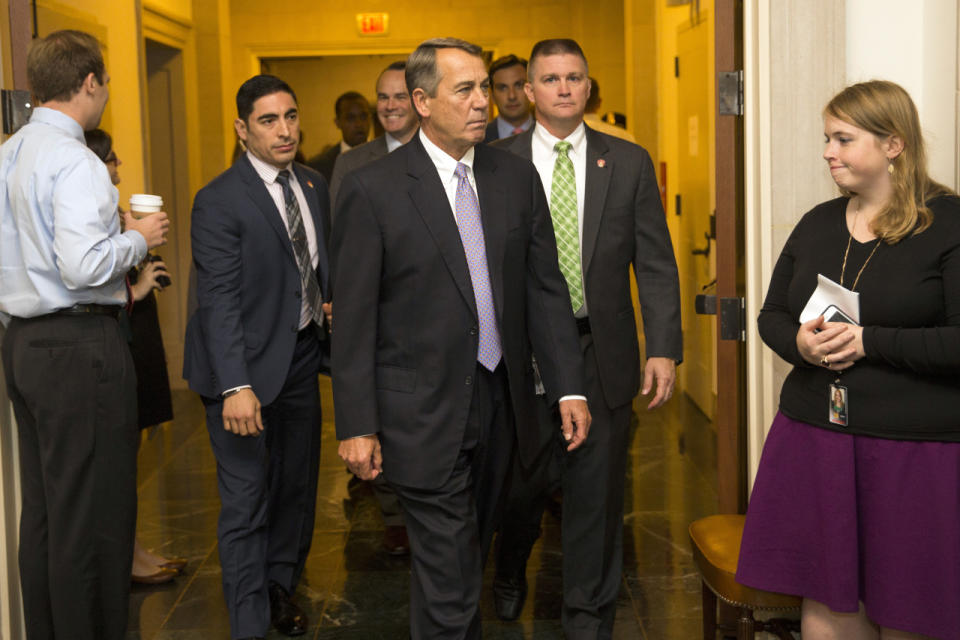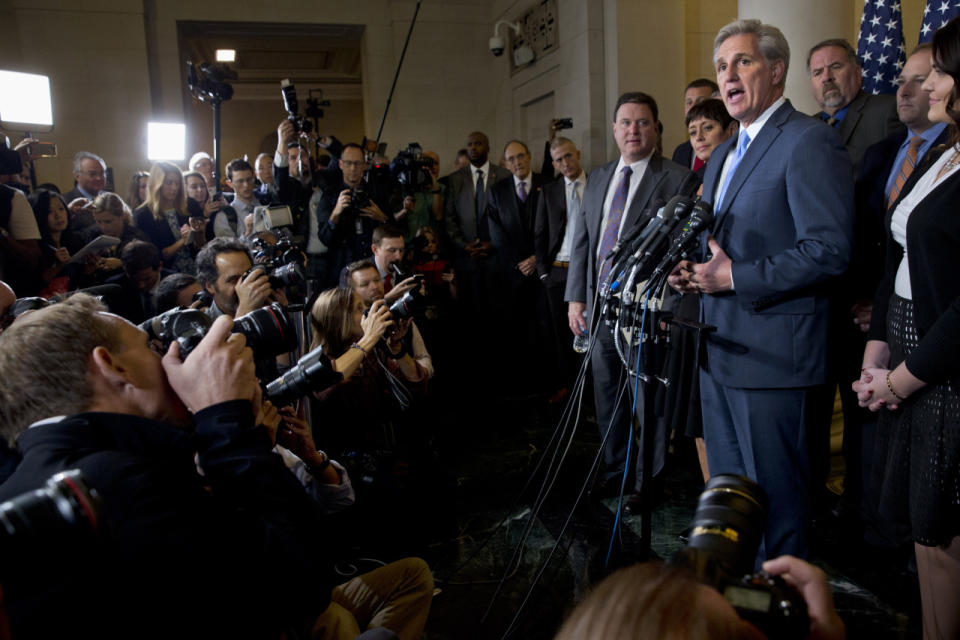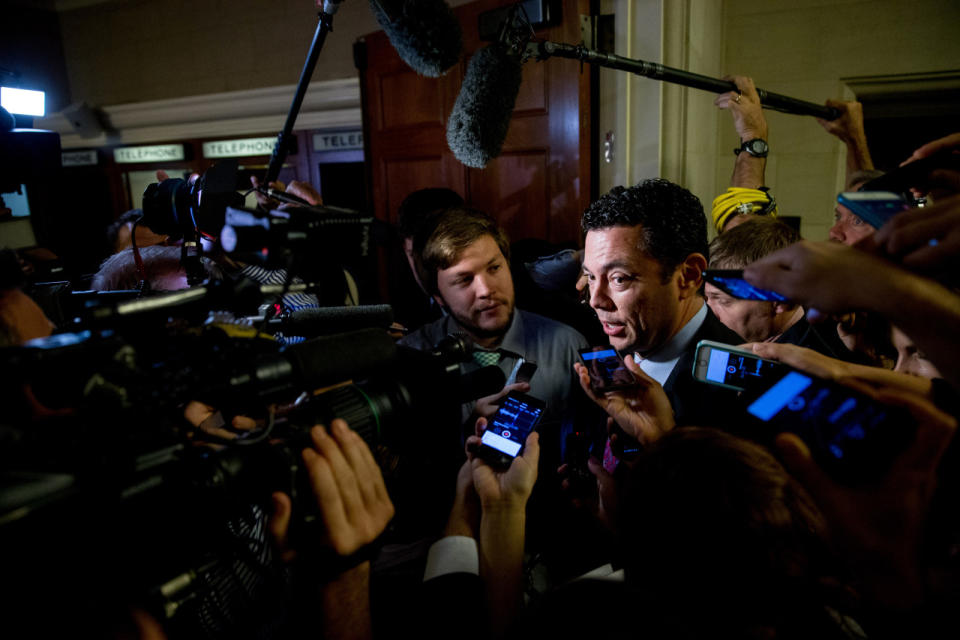John Boehner stuck in limbo as speaker after Kevin McCarthy withdraws bid
The same ultraconservative lawmakers who forced Speaker John Boehner, R-Ohio, to move up his planned resignation are now keeping him in a cruel congressional purgatory with no departure date in sight as his assumed successor dropped his speakership bid with no clear next-in-line.
Current House Majority Leader Kevin McCarthy, R-Calif., who was being groomed as Boehner’s replacement, sent shockwaves through Washington Thursday when he announced he would no longer seek the job. His withdrawal from consideration came just as a closed-door Republicans-only test vote for speaker was scheduled to begin.
According to a source in the room, McCarthy walked up to the microphone in front of the full conference, stood far away from it so he could barely be heard and began to make his remarks. After being cajoled to speak louder, McCarthy told his colleagues he never came to Congress to be speaker and that he would no longer be campaigning for the job.
Everyone in the room — including Boehner, who learned of McCarthy’s decision just moments before he announced it to the full GOP conference — was stunned. So were the throngs of reporters waiting outside the large conference room in the Capitol basement where members were meeting.
“I think I shocked some of you, huh?” McCarthy joked with reporters, after emerging from what was supposed to be a session that proved he had the votes to become the next speaker of the U.S. House of Representatives.
McCarthy’s decision is no laughing matter for Boehner, however. It forces him to go back to the drawing board for a strategy on how to exit Congress and shape a future for his party, over which he lost full control long ago.
Boehner had announced an Oct. 30 resignation date, but it is now very unlikely he will leave the speaker’s chair by then. Although McCarthy faced two challengers in Jason Chaffetz of Utah and Daniel Webster of Florida, neither is a clear successor, and the House has a long list of legislative items that must be cleared in the weeks to come. Boehner announced at the conference meeting Thursday that the speaker elections had been postponed indefinitely.

Outgoing House Speaker John Boehner of Ohio arrives for a meeting where Republicans will nominate candidates to replace him on Thursday on Capitol Hill in Washington. (Photo: Evan Vucci/AP)
An aide to the speaker said that Boehner “will not leave before a new speaker is in place.”
McCarthy’s bid had been complicated by an announcement Wednesday from the Freedom Caucus, a group of approximately 40 members who represent the farthest-right views within the GOP, that they would back Webster en bloc.
McCarthy would have needed 218 votes to win the gavel, and had previously hoped to pick off some of the strongest conservatives who have given the leadership heartburn over the years.
Congressional staff approached for this story said they had no idea who would be the next speaker now that McCarthy has bowed out.
McCarthy himself framed his decision to not seek the speakership — and instead run to stay in his post of majority leader — as a move to unite the party. That’s also how Boehner depicted his retirement announcement at the end of last month.

Majority Leader Kevin McCarthy of Calif. answers a question during a news conference on Capitol Hill in Washington on Thursday, after stepping down as a nominee for House Speaker to replace John Boehner. (Photo: Jacquelyn Martin/AP)
“It is imperative for us to unite and work together on the challenges facing our country. Over the last week it has become clear to me that our Conference is deeply divided and needs to unite behind one leader,” McCarthy said. “I have always put this Conference ahead of myself. Therefore I am withdrawing my candidacy for speaker of the House. I look forward to working alongside my colleagues to help move our Conference’s agenda and our country forward.”
In the lead-up to Thursday’s pseudo-elections for speaker (the real floor vote was not scheduled until Oct. 29), McCarthy had come under fire for comments he made on cable news crediting the House Select Committee on Benghazi for discrediting former Secretary of State Hillary Clinton’s bid to win the Democratic nomination for president.
Though Democrats pounced on those comments, it’s not at all clear that they made McCarthy lose favor with conservatives. Instead, it seems Republican disagreement over some of the larger legislative issues, especially the looming debt ceiling vote, weighed heavily.
SLIDESHOW: McCarthy withdraws his candidacy for House speaker >>
Boehner already had achieved a small feat through his resignation announcement, which allowed a two-month government funding bill to advance and avert a shutdown.
Now, bigger challenges loom, with the Treasury Department saying that Congress must act by early November to extend the nation’s ability to pay its debts before current resources are exhausted. Congress will also have to approve a long-term appropriations bill to fund the government — many had hoped through the 2016 elections — and a variety of other expiring measures, like an expiring transportation and infrastructure bill.
One Republican source said that McCarthy felt he could have secured the votes on the floor to become speaker, but just barely, and that it would have been very difficult to stage two very close, divisive votes in rapid succession, with the debt ceiling vote on the horizon.
Republicans have been loath to rely on Democratic support to clear major legislative hurdles, but near-constant dissent from conservative factions in the party has forced them to do so at almost every turn.
Meanwhile, Democrats are publicly delighting in the GOP’s dysfunction, even as they privately worry about what it might mean for the basic functioning of the government in the weeks ahead.
After McCarthy announced his decision not to run for speaker, Senate Democratic Leader Harry Reid, D-Nev., released a statement calling on House Republicans to move immediately on clean debt ceiling legislation, meaning a debt limit bill with no riders or additional spending cuts attached to it.

Rep. Jason Chaffetz, R-Utah speaks to reporters as he walks out of nomination vote meeting on Capitol Hill in Washington on Thursday, after House Majority Leader Kevin McCarthy of Calif. dropped out of the race to replace House Speaker John Boehner. (Photo: Andrew Harnik/AP)
“The utter chaos of the Republican party must not threaten the full faith and credit of the United States and the American people. While negotiations on a budget deal continue, we should work together immediately to take the threat of default off the table. Responsible Republican leaders should bring a clean debt ceiling increase to the floors of the House and Senate immediately and let it pass with a bipartisan coalition, as it certainly would,” Reid said. “Republican chaos is likely to get worse before it gets better but the economic livelihood of the American people should not be threatened as a result of Republicans’ inability to govern.”
Reid is right that the chaos might get worse — although it’s pretty complicated as it is now — but there’s no telling when House Republican leaders might be able to move on basic legislation given that no one knows who will lead them next.
In short: The fundamental tension between establishment Republicans, and their belief that they had some responsibility to govern, and the anti-government right-wing faction that welcomes shutdowns or obstruction remains active — and in the near-term may only get worse.
Yahoo News Senior Political Correspondent Jon Ward contributed to this report.

